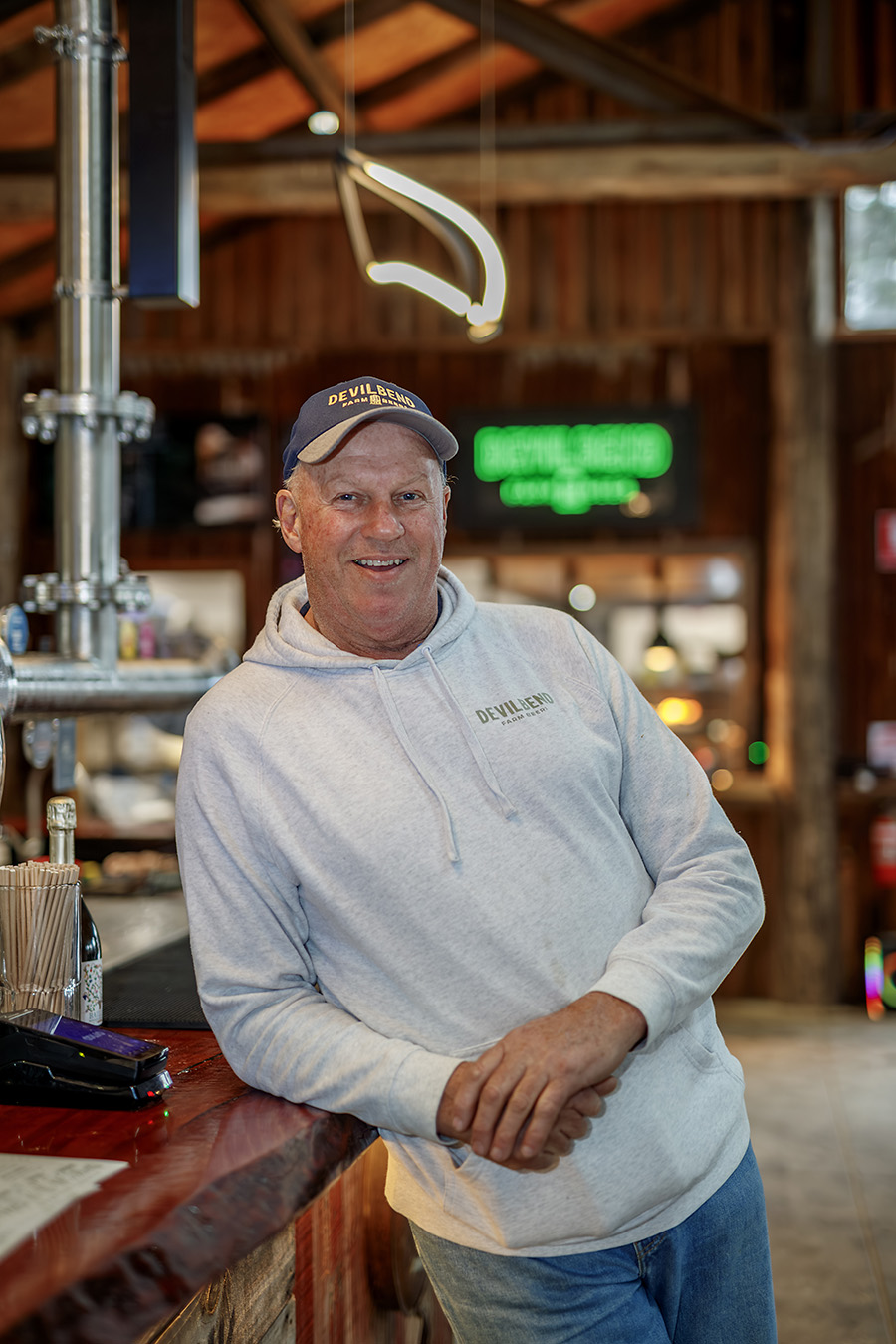
5 minute read
Hops & Dreams
By Sarah Halfpenny Photos Yanni
There are not many areas in Australia where you can successfully grow barley, hops and wheat in the one location
Most breweries buy their barley; Mike and Paula Shaw grow it. Most breweries source their hops from suppliers; Mike and Paula harvest them from their own fields. And when the Mornington Peninsula Shire Council told them they’d need to grow everything on-farm to get their brewery permit, their response was speedy: “Farmers all our lives. Happy days!” That enthusiasm has driven Devilbend Farm Beer to become something genuine and rare: a brewery where every ingredient carries the essence of the peninsula soil it sprang from.
The story begins with a property called Ned’s Corner, steeped in farming history. “When we first bought Ned’s Corner we fell in love with the farming history of the property, created by the two previous pioneer farming families; the Turners and the Unthanks,” Mike explains. “We thought it would be great to preserve and repurpose the coolstore, packing shed and blacksmith forge; structures they had created but were now falling into disrepair.”
“There are not many areas in Australia where you can successfully grow barley, hops and wheat in the one location, but the peninsula has an ideal climate for us to do so successfully,” Mike says.
The agricultural calendar at Devilbend reads like a symphony of seasons. From January’s barley straw baling to December’s harvest, every month brings its own rhythm. March sees the hop harvest, while the malting process begins in December, creating enough supply for the next twelve months.
It’s a delicate dance between farming and brewing that few operations attempt, let alone master. At the heart of their brewing operation is head brewer, Michael Stanzel, whose training brings authenticity to the craft. “Michael trained in Germany and is an exceptionally talented brewer,” Mike says. “He has also taken to the farming lifestyle like a duck to water. Whenever he’s not busy brewing and cellaring, he’s often to be found out in the paddock feeding the cows.”
One of Devilbend Farm Beer’s most intriguing features is their koelschip – a traditional shallow vessel with the primary purpose of enabling the production of spontaneously fermented beers. They’re one of only a few Australian breweries who own and use this piece of equipment.
Mike explains it in accessible terms: “After brewing, the hot wort is pumped into the koelschip. With the windows of the room left open, the wort is exposed to the natural air overnight. As it cools, it picks up wild yeasts from the local environment. By morning, the wort is cooled and infused with these native wild yeasts. It’s then transferred back down into the brewery to continue fermenting in a closed vessel or barrel, where the magic of wild fermentation unfolds.” This age-old technique creates beers that literally capture the essence of the peninsula’s unique microclimate.

The farm-to-table philosophy extends beyond beer to their food offerings. Their taproom menu features grass-fed cattle raised on the property, creating what Mike describes as “a great illustration of the full circle nature of farming.” Head Chef Reece Harley and his team embrace the challenge of using all the cuts from nose to tail.
Sustainability at Devilbend is entwined in every aspect of their operation. With 35KW solar panels, 5,000 trees planted, and creek fencing for environmental protection, they’re walking the talk. Wastewater is used for hop irrigation and brewery waste is fed to cattle, creating a closed-loop system that would make any environmentalist proud.
Peninsula residents have embraced Devilbend wholeheartedly. “Paula and I have honestly been overwhelmed and overjoyed at how much support we have received from the community, many of whom seem to have adopted us as their local meeting point,” Mike says. This success stems from their commitment to supporting other local businesses, from sourcing gluten-free beer from TwoBays Brewing Co. to collaborating with Red Hill Roast on their Coffee Pale Ale.
Mike is also involved with the local Victorian Farmers Federation branch and hopes to promote “a Mornington Peninsula Farmers Collective where we showcase peninsula food and beverages and provide a networking opportunity between local farm producers.” Their wine list reads like a who’s who of Peninsula producers: Stumpy Gully Vineyard, Quealy Winemakers, Elgee Park, and Barmah Park.
For Mike, the biggest lesson has been about building the right team. “We’ve learned the importance of having the right team of people around us so we can all grow together in what we call our Devilbend Family,” he says. This family atmosphere extends to visitors, with Mike explaining their intention to “create an environment where people of all ages could come together and experience something of what farm life is about.”
When asked about his favourite beer, Mike’s answer reflects his love of experimentation: “Currently Hazy Pale Ale, but I have become much more adventurous in my tastes and I love trying Mikey’s latest creation, whether it be a foreign export stout, a West Coast IPA or an Irish Red Ale. I’m always excited to see what comes next!”

Visitors to Devilbend Farm Beer can see cattle munching on spent grain from yesterday’s brew while tomorrow’s barley sways in the paddock beyond. It’s brewing stripped back to its agricultural roots: messy, seasonal, authentic and unpretentious.
In an industry obsessed with exotic ingredients and flashy marketing, Mike and Paula Shaw have found something pragmatic and far more rewarding: the magic of making beer exactly where it belongs.







